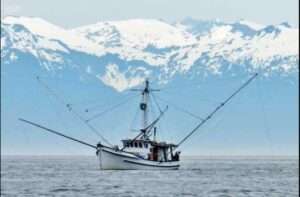The National Marine Fisheries Service (NMFS) has recently taken several actions in Wild Fish Conservancy v. Quan (the Southeast Alaska salmon fishery case).

The Wild Fish Conservancy v. Quan (the Southeast Alaska salmon fishery case) involves a challenge to a 2019 biological opinion that analyzes two actions related to salmon fishing in Southeast Alaska and a third action on a conservation program for habitat improvement and hatchery production to be implemented in the Pacific Northwest to offset the effects of salmon fisheries managed under the Pacific Salmon Treaty on ESA-listed Puget Sound Chinook salmon and Southern Resident Killer Whales. On May 2, 2023, the United States District Court for the Western District of Washington issued an order directing the National Marine Fisheries Service (NMFS) to address the Endangered Species Act (ESA) and National Environmental Policy Act (NEPA) deficiencies identified by the court. The court vacated portions of the incidental take statement (ITS) that exempts take of the Southern Resident Killer Whales and Chinook salmon resulting from the Chinook salmon commercial troll fishery in Southeast Alaska during the winter and summer seasons. The district court did not vacate portions of the biological opinion analyzing a prey increase program or enjoin the program, which is one component of the conservation program.
Following the district court’s order, there has been significant activity in this case. NMFS has taken several actions in response, as explained below, and NMFS is continuing to work expeditiously to respond to the court’s decisions.
On May 8, 2023, the State of Alaska filed a motion for a stay pending appeal on the portion of the district court’s order vacating the ITS. The Alaska Trollers Association joined that motion. On May 22, 2023, NMFS filed a response in support of the State’s motion for a stay pending appeal. NMFS argues that a stay pending appeal is warranted because the district court gave undue weight to any conservation benefits from the cessation of the commercial troll Chinook salmon fishery in Southeast Alaska, ignored the increased prey now available to Southern Resident Killer Whales through the prey increase program, and underestimated the severe economic consequences of vacatur of the ITS, which effectively closes the Southeast Alaska commercial troll fishery. This fishery supports communities across Southeast Alaska, most of which are small and isolated and some of which are Alaska Native communities, and there are over 1,000 active permit holders, many of whom are small-scale participants reliant on the fishery.
During this same time, the Plaintiff, Wild Fish Conservancy, filed a motion for an injunction pending appeal that requests that the court issue an injunction vacating the 2019 biological opinion with regard to the prey increase program. The State of Alaska, Alaska Trollers Association, and NMFS have all opposed that motion. NMFS argues that Wild Fish Conservancy continues to ignore the harm to Southern Resident Killer Whales if NMFS cannot implement the prey increase program, that NMFS has been analyzing and will continue to analyze the effects of the program on ESA-listed salmon through site-specific biological opinions and NEPA documents, and that the equities do not favor an injunction as the prey increase program specifically and directly benefits an endangered species (Southern Resident Killer Whales). NMFS plans to fully address the deficiencies identified by the district court by offering better reasoning on remand, which NMFS has indicated it will complete by no later than November 2024.
At this point, all parties have also filed notices of appeal to the United States Court of Appeals for the Ninth Circuit. The Defendant-Intervenors State of Alaska and Alaska Trollers Associations noticed their appeals on May 3, 2023, and May 5, 2023, respectively. Plaintiff Wild Fish Conservancy cross-appealed on May 4, 2023. And NMFS filed a notice of appeal on May 23, 2023.
